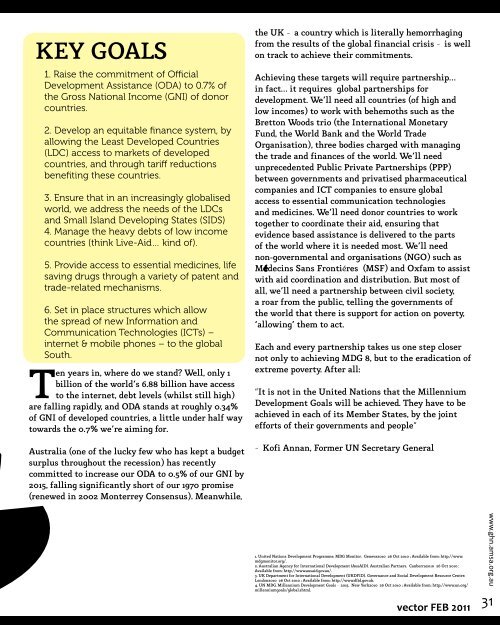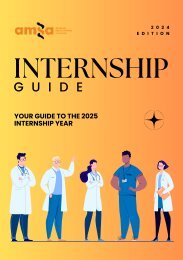Create successful ePaper yourself
Turn your PDF publications into a flip-book with our unique Google optimized e-Paper software.
key goals<br />
1. Raise the commitment of Official<br />
Development Assistance (ODA) to 0.7% of<br />
the Gross National Income (GNI) of donor<br />
countries.<br />
2. Develop an equitable finance system, by<br />
allowing the Least Developed Countries<br />
(LDC) access to markets of developed<br />
countries, and through tariff reductions<br />
benefiting these countries.<br />
3. Ensure that in an increasingly globalised<br />
world, we address the needs of the LDCs<br />
and Small Island Developing States (SIDS)<br />
4. Manage the heavy debts of low income<br />
countries (think Live-Aid… kind of).<br />
5. Provide access to essential medicines, life<br />
saving drugs through a variety of patent and<br />
trade-related mechanisms.<br />
6. Set in place structures which allow<br />
the spread of new Information and<br />
Communication Technologies (ICTs) –<br />
internet & mobile phones – to the global<br />
South.<br />
Ten years in, where do we stand? Well, only 1<br />
billion of the world’s 6.88 billion have access<br />
to the internet, debt levels (whilst still high)<br />
are falling rapidly, and ODA stands at roughly 0.34%<br />
of GNI of developed countries, a little under half way<br />
towards the 0.7% we’re aiming for.<br />
Australia (one of the lucky few who has kept a budget<br />
surplus throughout the recession) has recently<br />
committed to increase our ODA to 0.5% of our GNI by<br />
2015, falling significantly short of our 1970 promise<br />
(renewed in 2002 Monterrey Consensus). Meanwhile,<br />
the UK - a country which is literally hemorrhaging<br />
from the results of the global financial crisis - is well<br />
on track to achieve their commitments.<br />
Achieving these targets will require partnership…<br />
in fact… it requires “global partnerships for<br />
development. We’ll need all countries (of high and<br />
low incomes) to work with behemoths such as the<br />
Bretton Woods trio (the International Monetary<br />
Fund, the World Bank and the World Trade<br />
Organisation), three bodies charged with managing<br />
the trade and finances of the world. We’ll need<br />
unprecedented Public Private Partnerships (PPP)<br />
between governments and privatised pharmaceutical<br />
companies and ICT companies to ensure global<br />
access to essential communication technologies<br />
and medicines. We’ll need donor countries to work<br />
together to coordinate their aid, ensuring that<br />
evidence based assistance is delivered to the parts<br />
of the world where it is needed most. We’ll need<br />
non-governmental and organisations (NGO) such as<br />
Médecins Sans Frontiéres (MSF) and Oxfam to assist<br />
with aid coordination and distribution. But most of<br />
all, we’ll need a partnership between civil society,<br />
a roar from the public, telling the governments of<br />
the world that there is support for action on poverty,<br />
‘allowing’ them to act.<br />
Each and every partnership takes us one step closer<br />
not only to achieving MDG 8, but to the eradication of<br />
extreme poverty. After all:<br />
“It is not in the United Nations that the Millennium<br />
Development Goals will be achieved. They have to be<br />
achieved in each of its Member States, by the joint<br />
efforts of their governments and people”<br />
- Kofi Annan, Former UN Secretary General<br />
1. United Nations Development Programme. MDG Monitor. Geneva2010 [26 Oct 2010]; Available from: http://www.<br />
mdgmonitor.org/.<br />
2. Australian Agency for International Development (AusAID). Australian Partners. Canberra2010 [26 Oct 2010];<br />
Available from: http://www.ausaid.gov.au/.<br />
3. UK Department for International Development (UKDFID). Governance and Social Development Resource Centre.<br />
London2010 [26 Oct 2010]; Available from: http://www.dfid.gov.uk.<br />
4. UN MDG. Millennium Development Goals - 2015. New York2010 [26 Oct 2010]; Available from: http://www.un.org/<br />
millenniumgoals/global.shtml.<br />
www.ghn.amsa.org.au<br />
vector FEB <strong>2011</strong><br />
31

















